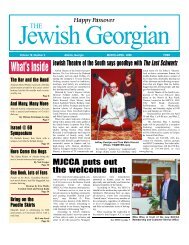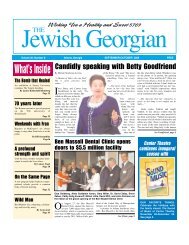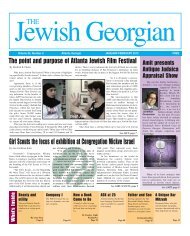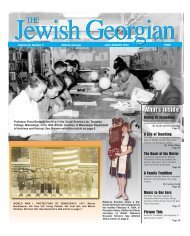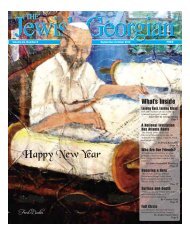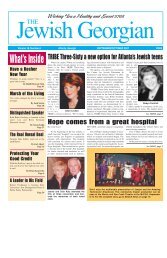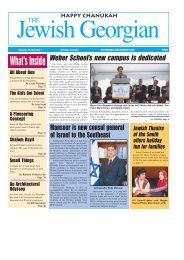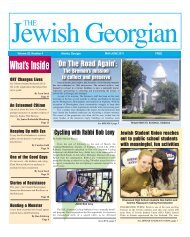You also want an ePaper? Increase the reach of your titles
YUMPU automatically turns print PDFs into web optimized ePapers that Google loves.
November-December 2010 THE JEWISH GEORGIAN Page 27<br />
<strong>The</strong> Breman<br />
From page 25<br />
Breman <strong>Jewish</strong> Heritage and Holocaust<br />
Museum by Benjamin Hirsch, child survivor,<br />
who gave a talk there. And I almost didn’t<br />
attend.<br />
With temperatures in the 70s and a clear<br />
blue sky, Sunday, October 3, was the kind of<br />
day to roam outside. I really wanted to visit<br />
the North Georgia State Fair to watch the elephant<br />
and tiger acts and enjoy the homegrown<br />
attractions. <strong>The</strong>n I found out that Ben<br />
was speaking as part of <strong>The</strong> Breman’s<br />
Bearing Witness program, and I felt guilty.<br />
How does a fair compare to a child survivor’s<br />
eyewitness account of the Holocaust?<br />
I decided to skip the fair this year and join<br />
around 200 others in the auditorium at <strong>The</strong><br />
Selig Center to hear the story of Ben Hirsch,<br />
who went on to be the designer of <strong>The</strong><br />
Breman Museum and architect of <strong>The</strong><br />
Memorial to the Six Million in Greenwood<br />
Cemetery, which is on the National Register<br />
of Historic Places. By the time Ben’s speech<br />
and PowerPoint presentation were over, I<br />
knew that I made the right choice. Ben was a<br />
child who fought elephants and tigers not at a<br />
fair but in a real-life arena of hatred and fear.<br />
And with the help of G-d, his devoted mother,<br />
and many others in France and Atlanta, he<br />
survived.<br />
Much of what Ben spoke about appears<br />
in his book, Home Is Where You Find It, published<br />
in 2006, but hearing him relate his<br />
story with passion, pain, and even humor<br />
deepened my commitment to keep the memory<br />
of the Holocaust alive—not just for those<br />
who perished and others, like Ben, who lived<br />
through it, but for all Jews, because it wasn’t<br />
just they. It was we, too.<br />
From the moment Benjamin Hirsch was<br />
born in Frankfurt, Germany, in September<br />
1932, he knew nothing but fear. <strong>The</strong> 5th child<br />
of Hermann and Mathilda Hirsch, he was<br />
told to never go out alone. Sometimes he didn’t<br />
listen; that’s when he was attacked by<br />
boys dressed in soldiers’ uniforms. Often, he<br />
ducked into a house, any house, calling out<br />
“Mama!” Little did he know that after<br />
Kristallnacht, Ben, at the age of six, would be<br />
without his mama, who would send him and<br />
his four older siblings on a Kindertransport to<br />
save their lives. He never saw his mother<br />
again but has made it his life’s work to find<br />
out what happened to both of his parents and<br />
his youngest brother and sister.<br />
Ben said the situation in Frankfurt was<br />
bad for his family before Kristallnacht. His<br />
father, a leader in the <strong>Jewish</strong> community, was<br />
a dentist. “Before discrimination, we did<br />
well,” said Ben, explaining that the Germans<br />
paid doctors and dentists for medical care<br />
through heavy taxes. “<strong>The</strong> health care system<br />
would be the envy of Barak Obama,” he<br />
joked. But all that changed when the government<br />
announced that <strong>Jewish</strong> medical<br />
providers wouldn’t get paid.<br />
Overnight, Ben’s father’s practice suffered.<br />
“We couldn’t put food on the table for<br />
seven,” said Ben, so older brother Asher and<br />
sister Flo were sent temporarily to family<br />
members in Holland. While others started to<br />
Ben Hirsch and Jane Leavy, executive<br />
director at <strong>The</strong> Breman Museum<br />
leave Germany, Hermann Hirsch stayed,<br />
because he thought that the situation would<br />
improve. “My father had this love for the<br />
<strong>Jewish</strong> community of Frankfurt,” Ben<br />
explained.<br />
In September 1935, Dr. Hirsch’s dental<br />
practice picked up when the Nuremberg laws<br />
forbade <strong>Jewish</strong> patients to be treated by non-<br />
<strong>Jewish</strong> doctors. Soon, Asher and Flo came<br />
home, and two more children were born to<br />
the Hirsch family: Werner and Roslene.<br />
By July 1938, FDR was receiving communications<br />
from people concerned about<br />
emigration for the Jews. He called for a convention<br />
at the resort Evian on the Swiss border<br />
and made a deal that the U.S. would<br />
match in number any nation that took in<br />
<strong>Jewish</strong> refugees. Hitler said that Jews could<br />
leave for $250 each, but only with the clothes<br />
on their backs. Dr. Heinrich Neumann, a<br />
Viennese Jew already incarcerated, was<br />
elected to give the case for saving the Jews.<br />
He spoke eloquently, and when he was finished,<br />
every nation wanted him, but no one<br />
else. Only the Dominican Republic offered to<br />
take in 1,000 Jews. According to Ben, Hitler<br />
used the nations’ lack of interest in saving the<br />
Jews in a speech saying, “<strong>The</strong> nations want to<br />
berate me, but not take them in.”<br />
One of Ben’s most painful memories<br />
was Kristallnacht, when, as a six-year-old, he<br />
saw fire flaring out of the windows of his<br />
synagogue and hoodlums opening up the<br />
Torah and piercing it on a picket fence. First,<br />
backing away from the site, he and his 14year-old<br />
cousin ran home. His father had<br />
already removed the outdoor sign with his<br />
name and a <strong>Jewish</strong> star on it, which all Jews<br />
were required to place in front of their<br />
homes. It was too late. A Nazi officer was<br />
watching the house for several hours. When<br />
Ben was older, he learned that the officer<br />
came that day for his father, but when his<br />
mother said he wasn’t in, the Nazi grabbed<br />
his baby sister from his mother’s arms and<br />
threw her to the ground. <strong>The</strong>n he threatened<br />
to kill her and each of the children if his<br />
father didn’t come out of hiding. Hearing<br />
this, his father immediately appeared. That<br />
was the last time Ben saw him.<br />
His mother, realizing the seriousness of<br />
the situation, made arrangements for her five<br />
oldest children to board a Kindertransport to<br />
France. Ben remembers that, for each piece<br />
of clothing she packed for him, a tear fell<br />
from his mother’s eyes. When finished, she<br />
placed all the bags in a baby carriage and<br />
with her children, ages 6-13, walked two<br />
miles to the train station. Years later, Ben<br />
found out that a 12-year-old boy on the<br />
Kindertransport, an “amateur psychologist”<br />
as Ben calls him, watched all the mothers<br />
place their children on the transport. He was<br />
curious about so many mothers sending off<br />
their children, knowing that they might never<br />
see them again. He decided to focus on Ben’s<br />
mother because she was placing five instead<br />
of one, two, or, at most, three children on the<br />
Kindertransport. Much later in America, Ben<br />
connected with this young man, who told<br />
him that as the train took off, Ben’s mama<br />
waved and then fainted on the platform.<br />
In France, Ben was sent to live with the<br />
Samuels family; they were kind to him, but<br />
as Jews, they, too, had to flee. <strong>The</strong>n he lived<br />
in different Oeuvre De Secours Aux Enfants<br />
(OSE) <strong>Jewish</strong> children’s homes. At one of the<br />
OSE homes, the staff noticed how thin Ben<br />
was, so they sent him off to a camp to fatten<br />
him up. But the camp turned out to be one of<br />
the worst experiences of his young life.<br />
Those in charge tore off his tzistzis and cut<br />
them up in front of him. <strong>The</strong>y tried to make<br />
him eat ham; he refused. As when his father<br />
was taken away, what happened next was<br />
blocked from his memory. (As a grown man,<br />
he read a book explaining that the counselors<br />
were trying to save the boys’ lives by taking<br />
the Jew out of them, which gave him some<br />
understanding of their behavior.)<br />
Back at the OSE, Ben received a<br />
telegram inviting him to escape to America<br />
along with his older brothers Asher and Jack.<br />
At the gathering of the children in Marseille,<br />
Ben had many helpings of hot soup and bread<br />
and awoke in the middle of the night with a<br />
terrible stomachache. <strong>The</strong> attending medic<br />
said it was appendicitis, and Ben couldn’t<br />
board the train to Spain with his brothers. As<br />
soon as Asher and Jack left, Ben’s stomach<br />
was better. A few months later, he was invited<br />
to join the last group of children headed<br />
for America. This time, he ate only one helping<br />
of soup and bread.<br />
He described how moving through<br />
Spain, a country that collaborated with the<br />
Nazis, was oppressive. Once the train arrived<br />
in Portugal, Ben felt a difference in the air.<br />
From there, he took a ship to America.<br />
Ben Hirsch signing his book<br />
When Ben arrived in Atlanta, he was<br />
nine years old and 43 pounds. He lived with<br />
many people, including the Bregmans, the<br />
Hershbergs, the Ungers, Ida Goncher, and<br />
then his sister Sara Shartar after she married.<br />
He attended Georgia Tech before going into<br />
the Army, which allowed him to travel back<br />
to Europe and find out more about his family.<br />
That part of his life is highlighted in his<br />
first book, Marching to a Different Drummer.<br />
At the Breman, Ben told several other<br />
stories, including one about a nurse who<br />
wanted to see him right away on visiting day<br />
at his daughter’s camp in the Catskills. <strong>The</strong><br />
nurse told Ben that he saved her life. When<br />
Ben couldn’t go to America with his brothers<br />
because of his misdiagnosed appendicitis,<br />
she took his place. She said that was her last<br />
chance, because she was soon turning 16 and<br />
would not be allowed to go.<br />
This past May, Ben and his wife, Jackie,<br />
were invited back to Frankfurt to attend a<br />
stone laying ceremony, part of an effort<br />
known as the Stolpersteine Initiative, in front<br />
of his old house. (Stolpersteine is German for<br />
“stumbling-block.”) Here, a German woman<br />
and two couples dedicated stones as they<br />
were cemented in front of the house that Ben<br />
and his family lived in before the Holocaust<br />
tore apart their family. <strong>The</strong> engraved metal<br />
plaques on the stones bear the names of his<br />
parents, sister, and brother; they also tell<br />
when and where they died. Jackie said that<br />
the couples were honored to support this<br />
effort. “<strong>The</strong>y were horrified by what their<br />
country did,” she said, “and they just want us<br />
to know it wasn’t them.”<br />
Yes, it may not be the Germans of today,<br />
but we are the Jews who survived the<br />
Holocaust—even those who are thousands of<br />
miles away, even those who weren’t born yet.<br />
“Should we be fearful in America?” asked<br />
someone during the question-and-answer<br />
session.<br />
“We should always be aware,” said Ben.<br />
<strong>The</strong>n he smiled, and many people, including<br />
his children and grandchildren, came up from<br />
the audience to express their appreciation for<br />
his moving presentation.



